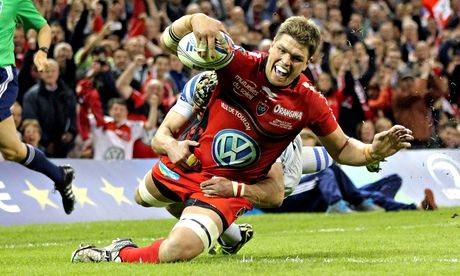
They shut the roof at the Millennium Stadium not, it appeared, to keep the last Heineken Cup final dry, but to capture and bottle its essence. Maybe it was a final attempt by ERC – the governing body on the way to the scaffold – to make a last bob or two from the particular fragrance of their 19-year-old creation. It is perhaps typical of their luck that the odour of the day was a little stinker.
There was no air. This was an exercise in nullification, in holding the pillow firmly in place over the face of creativity. Craig Burden launched himself – using his arms and, thus, staying within the bounds of rugby law – into the face of his opposite number, fellow South African Schalk Brits, in one of those personal confrontations that you tell yourself you have to win for the common good. But so ferocious was this feud that it became all-consuming, and far from freeing up room elsewhere for the artistes, it simply set the example for everyone else to follow.
Jacques Burger was the first to accept the constrictions of the day; this was an order of events specifically written with him in mind. One clubbing of Bakkies Botha – it was beyond a tackle – stuck in the mind, although his victim, ancient and armadillo-plated, barely seemed to notice.
Such an appetite for the physical over the cerebral affected – infected – the best. Juan Martín Fernández Lobbe, so gifted that he can usually tape his eyes shut and catch a rugby ball falling out of the sky, dropped the very first kick-off. The freres Armitage, who have spent all of their lives knowing which is going to do what where, stood and stared at each other as a kick – until their indecision, utterly harmless – fell between them, and the innocuous turned to panic.
It wasn’t quite so unusual to see Owen Farrell touched by the fever of the night. When Bryan Habana chipped over him, the fly-half couldn’t resist checking the wing. Habana made it look as if Farrell had pulled an elephant gun on him but the replay still revealed that Farrell, once again, had been led into temptation, into the clutches of the lawless.
Could no one escape the suffocation and breathe? Not Farrell; not Richard Wigglesworth, who had a kick charged down close to his own goalline. Not Brad Barritt, who slung a pass into touch when a counterattack looked promising. Not Steve Borthwick, who took the brave decision to play to try to end his career in glory, but who looked far from sound of body and free of movement. Even Billy Vunipola – who can be guaranteed to batter his way into a bit of open field – found himself chopped down. The No8 was tamed, whereas Steffon Armitage recovered from his mix-up and became increasingly prominent, speedy over the ground and ubiquitous over the ball. He touched it far more often than Chris Ashton and David Strettle combined, Saracens’ wings denied any decent passes and unable to find a square inch of freedom.
A clutch of players could stand apart – and they all wore the colours of Toulon. They chose to do it at the most difficult moment, when their side were down to 14 men, Lobbe having been binned for a tug on Kelly Brown’s shirt when the Scotsman was off his feet. All it took was a switch of direction, an understanding that one way lay congestion and the other half a chance. Jonny Wilkinson changed direction, and that was all he did. But it was enough to give Matt Giteau the space to fashion a kick, a tumbling end-over-end special that Drew Mitchell understood and pursued.
There was still work to do when the Australian wing caught the ball, but his pass to Giteau, delivered out of heavy contact, was perfect. Giteau, who had initiated the real thrust – after Wilkinson’s prompting – finished the move, and the theme of a player staying in play and being rewarded for his support was set, as firmly now as the original imposition of crushing physicality.
When Toulon scored their second try, it began with a pass by Wilkinson – not as tidy as his first, but still effective in giving a notion of freedom to Mitchell. The wing found Mathieu Bastareaud, who, wonder of wonders, set off at a gallop without slowing to find contact. The centre found instead Juan Smith, who caught the ball, one-handed and behind him, at full speed – and here the old give-and-take worked again. Smith found Lobbe, and Lobbe found Smith. It was a glorious try, its outstanding quality underlined by the very fact that it was not sent for video review by the referee.
A special word for Smith, the former Springbok, who was brilliant throughout. When confrontation was the sole order of the day, he made as many tackles as anyone, most of them bone-jarringly effective. But when the hermetically sealed stadium allowed a gasp of artfulness to seep in, Smith was there, passing, interchanging … alert.
Playing in Cardiff, in south Wales, with the roof shut on a foul day at the end of May sounds far removed from the conditions Toulon enjoy in their corner of the continent, but they adapted better to the occasion. They looked at home in this foreign field. They launched themselves with the ferocity demanded by the final, and yet reached for the highly prized perfume of composure when the moment presented itself. For all its lack of oxygen, this was a game won by the team who breathed.

